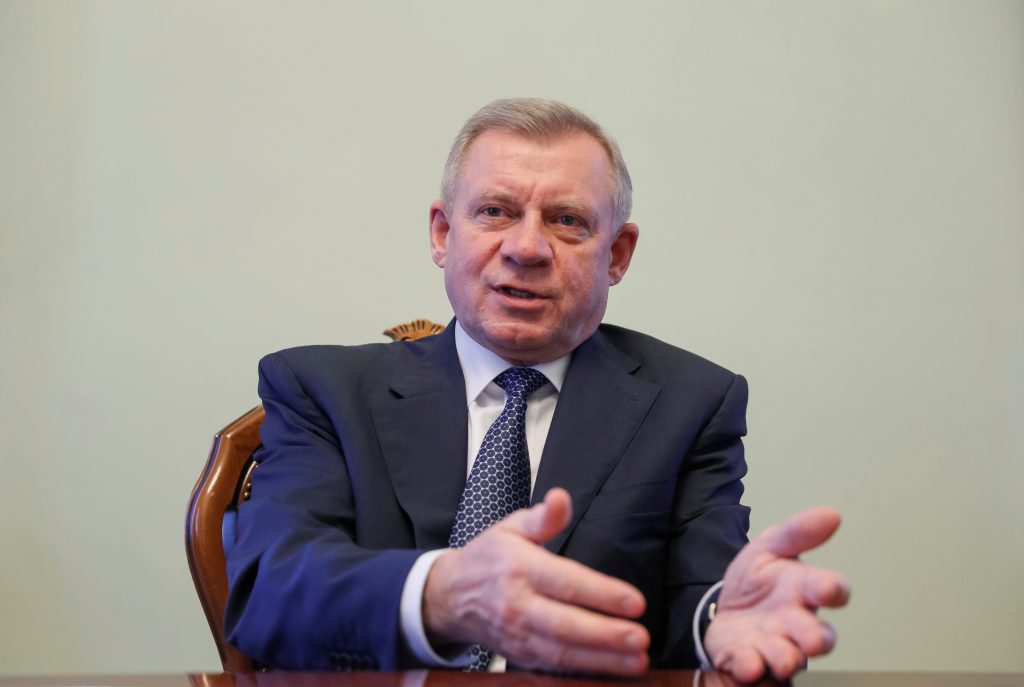Yakiv Smoliy's resignation in protest as Ukraine's central bank chief due to "systematic political pressure" put at risk the country's $5 billion economic assistance deal agreed with the International Monetary Fund (IMF) last month.
The IMF, which insists that Ukraine must maintain the independence of the National Bank of Ukraine (NBU), noted that under Smoliy's leadership, the NBU achieved price stability.
Smoliy's resignation also pulled sovereign bonds down by over two cents and sent the local hryvnia currency plunging to its lowest level against the dollar since April.
The fallout from Smoliy's resignation, accepted by President Volodymyr Zelenskyy on Thursday, prompted the finance ministry to say it was not going ahead with a planned offering of dollar-denominated Eurobonds.
Smoliy emphasized that the pressure had denied him the fulfillment of his duties as the Governor, and his resignation should serve as a warning for attempts to undermine the central bank's institutional independence.
Ukraine's central bank has previously complained of being subjected to pressure, including over its 2016 decision to nationalize the country's largest lender, PrivatBank, which formerly belonged in part to Ihor Kolomoisky, a Zelenskyy backer.
Zelenskyy denied giving favors and publicly expressed the need for an independent central bank.
According to Timothy Ash at Blue Bay Asset Management, the development is terrible news for Ukraine as the NBU is the most trusted institution among foreign institutional investors.



 Trump’s Inflation Claims Clash With Voters’ Cost-of-Living Reality
Trump’s Inflation Claims Clash With Voters’ Cost-of-Living Reality  Trump Signs Executive Order Threatening 25% Tariffs on Countries Trading With Iran
Trump Signs Executive Order Threatening 25% Tariffs on Countries Trading With Iran  RBA Raises Interest Rates by 25 Basis Points as Inflation Pressures Persist
RBA Raises Interest Rates by 25 Basis Points as Inflation Pressures Persist  Trump Says “Very Good Talks” Underway on Russia-Ukraine War as Peace Efforts Continue
Trump Says “Very Good Talks” Underway on Russia-Ukraine War as Peace Efforts Continue  India–U.S. Interim Trade Pact Cuts Auto Tariffs but Leaves Tesla Out
India–U.S. Interim Trade Pact Cuts Auto Tariffs but Leaves Tesla Out  Federal Judge Restores Funding for Gateway Rail Tunnel Project
Federal Judge Restores Funding for Gateway Rail Tunnel Project  US Pushes Ukraine-Russia Peace Talks Before Summer Amid Escalating Attacks
US Pushes Ukraine-Russia Peace Talks Before Summer Amid Escalating Attacks  South Africa Eyes ECB Repo Lines as Inflation Eases and Rate Cuts Loom
South Africa Eyes ECB Repo Lines as Inflation Eases and Rate Cuts Loom  Bank of Japan Signals Cautious Path Toward Further Rate Hikes Amid Yen Weakness
Bank of Japan Signals Cautious Path Toward Further Rate Hikes Amid Yen Weakness  Bank of England Expected to Hold Interest Rates at 3.75% as Inflation Remains Elevated
Bank of England Expected to Hold Interest Rates at 3.75% as Inflation Remains Elevated  U.S. Announces Additional $6 Million in Humanitarian Aid to Cuba Amid Oil Sanctions and Fuel Shortages
U.S. Announces Additional $6 Million in Humanitarian Aid to Cuba Amid Oil Sanctions and Fuel Shortages  Norway Opens Corruption Probe Into Former PM and Nobel Committee Chair Thorbjoern Jagland Over Epstein Links
Norway Opens Corruption Probe Into Former PM and Nobel Committee Chair Thorbjoern Jagland Over Epstein Links  South Korea Assures U.S. on Trade Deal Commitments Amid Tariff Concerns
South Korea Assures U.S. on Trade Deal Commitments Amid Tariff Concerns  TrumpRx.gov Highlights GLP-1 Drug Discounts but Offers Limited Savings for Most Americans
TrumpRx.gov Highlights GLP-1 Drug Discounts but Offers Limited Savings for Most Americans  New York Legalizes Medical Aid in Dying for Terminally Ill Patients
New York Legalizes Medical Aid in Dying for Terminally Ill Patients  Trump Signs “America First Arms Transfer Strategy” to Prioritize U.S. Weapons Sales
Trump Signs “America First Arms Transfer Strategy” to Prioritize U.S. Weapons Sales 































